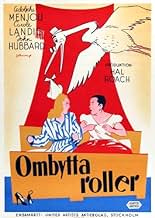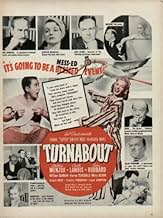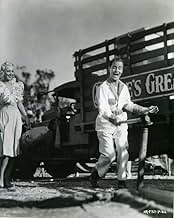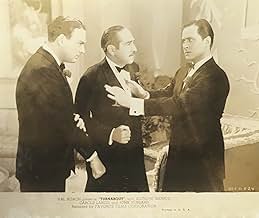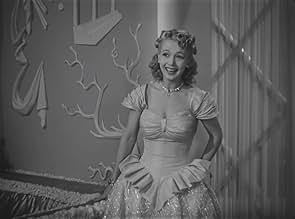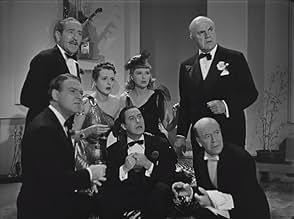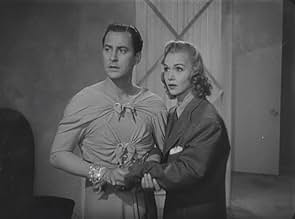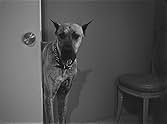AVALIAÇÃO DA IMDb
6,1/10
825
SUA AVALIAÇÃO
Adicionar um enredo no seu idiomaBickering husband and wife Tim and Sally Willows mutter a few angry words to a statue of Buddha and wind up living each other's life.Bickering husband and wife Tim and Sally Willows mutter a few angry words to a statue of Buddha and wind up living each other's life.Bickering husband and wife Tim and Sally Willows mutter a few angry words to a statue of Buddha and wind up living each other's life.
- Direção
- Roteiristas
- Artistas
Avaliações em destaque
Turnabout is the story of a married couple who bickers more than anyone you've ever seen. Mr. Willows (John Hubbard) and Mrs. Willows (Carole Landis) lead separate lives, and come home to fight about it. Mr. Willows is a partner for an advertising company and Mrs. Willows gossips and plays bridge with the other partners' wives. But there is one thing they can agree upon; they would love to switch lives with each other. A mysterious statue in their bedroom grants their request, and off he goes in a dress and off she goes prancing around in a suit. To say that their acquaintances are surprised would be an understatement and hilarity ensues.
Also appearing are famous names like Adolphe Menjou, Mary Astor, Inez Courtney, and Marjorie Main.
Stories like this are always entertaining, and when comedies are made on the Hal Roach lot, you're bound for success. This little known gem holds plenty of laughs, but it also abounds with a lightheartedness that can cheer anyone up on a bad day.
Also appearing are famous names like Adolphe Menjou, Mary Astor, Inez Courtney, and Marjorie Main.
Stories like this are always entertaining, and when comedies are made on the Hal Roach lot, you're bound for success. This little known gem holds plenty of laughs, but it also abounds with a lightheartedness that can cheer anyone up on a bad day.
Carole Landis and John Hubbard play Sally and Tim Willows, a fairly bland married couple whose bickering accelerates to a point where they wish aloud that they could trade places
and whose wish is granted by a statue that sits on their bedroom shelf.
The opening scenes meander a bit, but we get to know Tim's eccentric business partners, their catty wives with whom Sally hangs out, and the Willows' domestic staff—all nicely played by a cast of veteran character actors led by Adolphe Menjou as one of Tim's partners.
It's when Sally and Tim switch bodies that the picture takes off—that is, when Sally takes on the personality and mannerisms of Tim, and vice versa. Landis and Hubbard are both hilarious; Landis is especially funny when she affects her husband's athletic swagger and broad gestures.
Donald Meek and Marjorie Main are typically entertaining as valet and cook; Mary Astor lends an edge as Menjou's wife. Franklin Pangborn has a funny bit as a Mr. Pingboom (not Mr. Pingpong, as he is called to his annoyance).
Other memorable moments include Landis (in her ultra-masculine persona) shinnying up a flagpole to install a radio aerial, and a rather surreal scene in which Menjou and William Gargan attempt to destroy a radio that just won't shut off. (They break it to pieces but it just keeps on playing.)
It's no classic but done in good spirits and occasionally hilarious.
The opening scenes meander a bit, but we get to know Tim's eccentric business partners, their catty wives with whom Sally hangs out, and the Willows' domestic staff—all nicely played by a cast of veteran character actors led by Adolphe Menjou as one of Tim's partners.
It's when Sally and Tim switch bodies that the picture takes off—that is, when Sally takes on the personality and mannerisms of Tim, and vice versa. Landis and Hubbard are both hilarious; Landis is especially funny when she affects her husband's athletic swagger and broad gestures.
Donald Meek and Marjorie Main are typically entertaining as valet and cook; Mary Astor lends an edge as Menjou's wife. Franklin Pangborn has a funny bit as a Mr. Pingboom (not Mr. Pingpong, as he is called to his annoyance).
Other memorable moments include Landis (in her ultra-masculine persona) shinnying up a flagpole to install a radio aerial, and a rather surreal scene in which Menjou and William Gargan attempt to destroy a radio that just won't shut off. (They break it to pieces but it just keeps on playing.)
It's no classic but done in good spirits and occasionally hilarious.
Bickering husband and wife (John Hubbard, Carole Landis) have their minds switched thanks to a magic statue they call Mr. Ram. Landis is gorgeous, funny, and the primary reason to recommend this movie. Hubbard is OK but nothing special. The supporting cast includes Donald Meek, William Gargan, Franklin Pangborn, and Marjorie Main. Solid supporting actors all. Mary Astor appears in a wasted role as a friend of Landis' before The Maltese Falcon would reinvigorate her career the following year. Adolphe Menjou is annoying as a partner in the husband's ad agency. His entire role in the movie is yelling at various people. It gets old fast.
The madcap stuff doesn't really get underway until about midway through. The first 35-40 minutes is mostly setup, establishing these two characters' personalities and relationships. This probably could have been trimmed down to 10-15 minutes and I believe it would have helped the movie considerably. Everything involving the dog and then the bear was completely irrelevant and seemed to be tacked on because someone thought "Hey! Animals are funny. Let's do that." The first half is a slog to get through but the second half is lots of fun. I saw it years ago and didn't like it but just saw it for a second time and came away with a more favorable opinion. It's a very unique and risqué film for 1940. Carole Landis fans will love it most. It's probably her best role.
The madcap stuff doesn't really get underway until about midway through. The first 35-40 minutes is mostly setup, establishing these two characters' personalities and relationships. This probably could have been trimmed down to 10-15 minutes and I believe it would have helped the movie considerably. Everything involving the dog and then the bear was completely irrelevant and seemed to be tacked on because someone thought "Hey! Animals are funny. Let's do that." The first half is a slog to get through but the second half is lots of fun. I saw it years ago and didn't like it but just saw it for a second time and came away with a more favorable opinion. It's a very unique and risqué film for 1940. Carole Landis fans will love it most. It's probably her best role.
Watching Turnabout and knowing it was produced and directed by Hal Roach right after One Million BC which made stars of Victor Mature and Carole Landis, I'm wondering if Roach didn't want to do this film with both of stars from One Million BC. For whatever reason Mature didn't do this one, Roach co-starred Landis with John Hubbard who was also in the cast of One Million BC.
Known primarily for his short subjects, Roach occasionally did a feature film that bent a few rules of the Code. Possibly because he was not in with the major film studios, Roach had a whole lot more creative freedom and is Turnabout he made the most of it.
Landis and Hubbard are a young and constantly bickering couple. He's a partner in an advertising agency with William Gargan and Adolph Menjou. And her two best friends are Mary Astor and Joyce Compton, said wives of Menjou and Gargan.
After a day of quarreling both express a wish to live each other's lives and they express it before a statue of a Hindu deity named Ram which grants their wish. Whoosh, and they're in each other's attire and talking for the audience's amusement with each other's voices.
After that it's a succession of gender bending jokes and lines which come so fast it's a crying shame that Turnabout is not out on DVD or VHS. With those you have the luxury of rewinding and hearing it again to catch what you missed. And this is the kind of film where you can watch it over and over and still come up with a fresh laugh.
For a small studio Roach's reputation was such that he commanded a supporting cast that could and did equal a film from any of the major studios. Besides the names already mentioned Turnabout includes Marjorie Main, Verree Teasdale, Franklin Pangborn, Berton Churchill and Donald Meek.
The last includes the funniest sight gag in the film. Meek plays Hubbard's manservant and he's quite a sight trying to deal with a ferocious little dog that looks more like a bear cub. Absolutely hilarious and there's quite the story of how that dog came into the possession of Hubbard and Landis.
This film must have been in the inspiration for those Walt Disney Freaky Friday films and the Dudley Moore/Kirk Cameron film Like Father Like Son. But none of those could boast a cast like this.
This one is an absolute gem, just waiting to be rediscovered.
Known primarily for his short subjects, Roach occasionally did a feature film that bent a few rules of the Code. Possibly because he was not in with the major film studios, Roach had a whole lot more creative freedom and is Turnabout he made the most of it.
Landis and Hubbard are a young and constantly bickering couple. He's a partner in an advertising agency with William Gargan and Adolph Menjou. And her two best friends are Mary Astor and Joyce Compton, said wives of Menjou and Gargan.
After a day of quarreling both express a wish to live each other's lives and they express it before a statue of a Hindu deity named Ram which grants their wish. Whoosh, and they're in each other's attire and talking for the audience's amusement with each other's voices.
After that it's a succession of gender bending jokes and lines which come so fast it's a crying shame that Turnabout is not out on DVD or VHS. With those you have the luxury of rewinding and hearing it again to catch what you missed. And this is the kind of film where you can watch it over and over and still come up with a fresh laugh.
For a small studio Roach's reputation was such that he commanded a supporting cast that could and did equal a film from any of the major studios. Besides the names already mentioned Turnabout includes Marjorie Main, Verree Teasdale, Franklin Pangborn, Berton Churchill and Donald Meek.
The last includes the funniest sight gag in the film. Meek plays Hubbard's manservant and he's quite a sight trying to deal with a ferocious little dog that looks more like a bear cub. Absolutely hilarious and there's quite the story of how that dog came into the possession of Hubbard and Landis.
This film must have been in the inspiration for those Walt Disney Freaky Friday films and the Dudley Moore/Kirk Cameron film Like Father Like Son. But none of those could boast a cast like this.
This one is an absolute gem, just waiting to be rediscovered.
Although not a great film this is never the less, in its own way, unforgettable. The first section of the film plays as a light comedy and is amusing enough. As soon as the gender reversal fun begins, however, it moves into a different league - one which startles by the casual way it plays with sexual expectations and stereotyping.
The Willows' transformation (through the creaky genie device) is potentially explosive stuff and, to his credit, Roach successfully steers an innocent course between pantomime and farce. Although the sexual naivety of the film is obvious, to modern eyes the homosexual/lesbian resonance of the scenario is still very funny and, for its time, I think rather daring. Hubbard's fey alter ego especially is a joy to behold, and I am surprised that this film is not better known to lovers of gay camp.
Some elements of the supporting plot reinforces the echoes of sex and gender play too: the mix up with the pets for instance, prefiguring later confusions over role, or Willows' over-aggressive personal trainer, whose grappling is suggestive of an unwanted sexual encounter. Even the running joke of hiding drink from the wife suggests a furtive vice, again particularly apposite in context.
Menjou and Landis lend a touch of class to the proceedings, and although studio-bound, and not particularly realistic in scale, the set design is elegant and spacious. The otherwise (to me) unknown John Hubbard reminds me of Ed Wood in Glen or Glenda - it's that sort of film, where men slip on Angora sweaters and then light a pipe.
This is a project that is more successful exactly because it is directed by comedy veteran Roach. It would have perhaps emerged as a far safer, and therefore far less enjoyable vehicle in the hands of a larger studio or, if made by a director with a different background.
The Willows' transformation (through the creaky genie device) is potentially explosive stuff and, to his credit, Roach successfully steers an innocent course between pantomime and farce. Although the sexual naivety of the film is obvious, to modern eyes the homosexual/lesbian resonance of the scenario is still very funny and, for its time, I think rather daring. Hubbard's fey alter ego especially is a joy to behold, and I am surprised that this film is not better known to lovers of gay camp.
Some elements of the supporting plot reinforces the echoes of sex and gender play too: the mix up with the pets for instance, prefiguring later confusions over role, or Willows' over-aggressive personal trainer, whose grappling is suggestive of an unwanted sexual encounter. Even the running joke of hiding drink from the wife suggests a furtive vice, again particularly apposite in context.
Menjou and Landis lend a touch of class to the proceedings, and although studio-bound, and not particularly realistic in scale, the set design is elegant and spacious. The otherwise (to me) unknown John Hubbard reminds me of Ed Wood in Glen or Glenda - it's that sort of film, where men slip on Angora sweaters and then light a pipe.
This is a project that is more successful exactly because it is directed by comedy veteran Roach. It would have perhaps emerged as a far safer, and therefore far less enjoyable vehicle in the hands of a larger studio or, if made by a director with a different background.
Você sabia?
- CuriosidadesPolly Ann Young, who plays Miss Twill, is the older sister of film star Loretta Young.
- Erros de gravaçãoWhen the woman's personality is in the man's body and the actor in the part shows this with female reactions and gestures, he looks at his fingernails by holding his hand palm up and bending the fingers toward himself. This is the way a man, not a woman, regards their fingernails, and it often appears in fiction as one way by which a man dressed as a woman is caught out. Women study their fingernails by holding a hand palm down and extending the fingers so that they are flat with the rest of the hand.
- Citações
Sally Willows: Now listen to me, Tim Willows, the situation with this dog of yours has gone entirely too far. He goes to a kennel tomorrow or I go!
Tim Willows: Darling, you wouldn't have much fun in a kennel.
- Trilhas sonorasMargie
(1920) (uncredited)
Music by Con Conrad and J. Russel Robinson
Lyrics by Benny Davis
Sung by a chorus on radio with modified lyrics
Principais escolhas
Faça login para avaliar e ver a lista de recomendações personalizadas
- How long is Turnabout?Fornecido pela Alexa
Detalhes
- Data de lançamento
- País de origem
- Central de atendimento oficial
- Idioma
- Também conhecido como
- Turnabout
- Locações de filme
- Empresa de produção
- Consulte mais créditos da empresa na IMDbPro
- Tempo de duração
- 1 h 23 min(83 min)
- Cor
- Proporção
- 1.33 : 1
Contribua para esta página
Sugerir uma alteração ou adicionar conteúdo ausente

